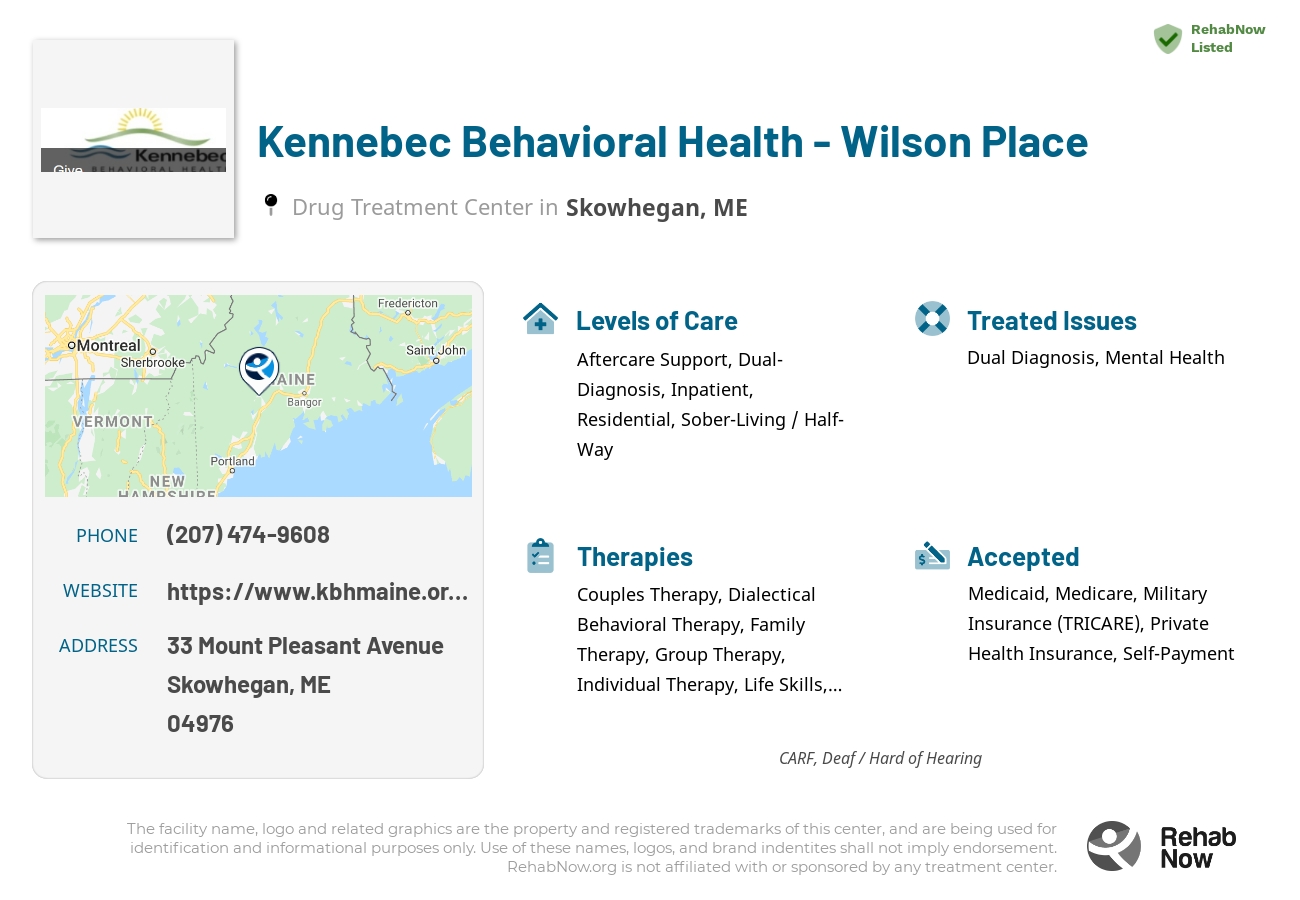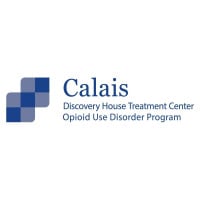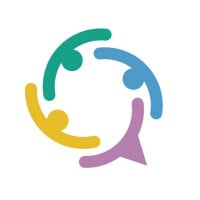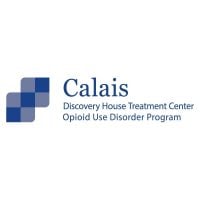Kennebec Behavioral Health - Wilson Place
Drug Rehab Center in Skowhegan, Maine
Kennebec Behavioral Health - Wilson Place in Skowhegan is an outpatient treatment center offering mental health and substance abuse services, including individual and family therapy, and has various accreditations and awards as well as LGBTQ-friendly support services.
About Kennebec Behavioral Health - Wilson Place in Maine
Kennebec Behavioral Health - Wilson Place, nestled in Skowhegan, Maine, stands out as a Residential Supported Housing Program tailored for individuals grappling with mental illness who require intensive support. This facility is not just about providing a roof over one’s head; it’s about fostering well-being across all ages through community-based, high-quality, and innovative services. From offering rental subsidies to medication assistance and 24/7 residential support, Kennebec Behavioral Health - Wilson Place is dedicated to ensuring successful community living.
- 24/7 Residential Support: Around-the-clock assistance ensures that residents always have access to the help they need.
- Comprehensive Services: From skills development to medication assistance, the program covers a wide range of needs to promote successful community integration.
- Innovative and High-Quality Care: Emphasizes the use of innovative approaches to deliver high-quality care, tailored to the unique needs of each resident.
Kennebec Behavioral Health - Wilson Place is not only accredited by the Joint Commission on Accreditation of Healthcare Organizations and the Department of Health and Human Services but also boasts a CARF certification, highlighting its commitment to excellence in service provision. The facility’s array of accolades, including a Green Ribbon Award, underscores its dedication to creating a safe, inclusive, and supportive environment for all clients.
The center addresses a variety of issues, including substance abuse, mental health disorders, and co-occurring disorders, offering individual and family therapy, group sessions, and referrals for further services. Treatment methods are diverse, ensuring that each individual’s path to recovery is as unique as their needs, with a particular emphasis on creating a supportive environment for individuals from the LGBTQ community.
Genders
Ages
Modality
Additional
Accreditations

CARF
The Commission on Accreditation of Rehabilitation Facilities (CARF) is a non-profit organization that specifically accredits rehab organizations. Founded in 1966, CARF's, mission is to help service providers like rehab facilities maintain high standards of care.
Conditions and Issues Treated
A “dual diagnosis” is when the individual has two medical issues at the same time. The top co-occurring mental disorders with addiction are depression, anxiety, ADHD, bi-polar disorder. Addiction is also considered a mental illness that is not a choice but rather a medical condition. Addiction can be caused by any number of underlying issues.
Dual diagnosis is provided by Kennebec Behavioral Health - Wilson Place to treat addictive tendencies as well as any untreated mental illnesses. This ensures successful long term health and recovery for patients after treatment has been completed.
Dual diagnosis is provided by Kennebec Behavioral Health - Wilson Place to treat addictive tendencies as well as any untreated mental illnesses for people in Maine. This ensures successful long term health and recovery for patients after treatment has been completed.Levels of Care Offered
This center offers a variety of custom treatment tailored to individual recovery. Currently available are Aftercare Support, Dual-Diagnosis, Inpatient, Residential, Sober-Living / Half-Way, with additional therapies available as listed below.
Going to an inpatient rehab facility means living there while all aspects of addiction or co-occurring disorder get addressed. The treatment involves medical supervision, therapy, and future planning.
This type of rehabilitation provides a drug-free environment for people who struggle with chronic/long-term addiction without having access to drugs outside the center (or their own home). It takes away any distractions because they live there 24 hours per day. If someone is trying to break out old habits, which could lead them back into substance abuse, things like jobs or school can be put on hold until after they complete their stay to focus solely on recovery.
Sober living homes (abbreviated SLHs or sometimes sober houses ) are temporary housing for recovering addicts, most often those in early or mid stage recovery, who typically live in the home for 3 to 6 months.
The typical SLH functions as a halfway house, providing a stable living environment for addicts in recovery.
While at an SLH, residents typically meet with various therapists on site and attend regular 12-step meetings as well as other recovery group meetings.
Residential treatment programs are those that offer housing and meals in addition to substance abuse treatment. Rehab facilities that offer residential treatment allow patients to focus solely on recovery, in an environment totally separate from their lives. Some rehab centers specialize in short-term residential treatment (a few days to a week or two), while others solely provide treatment on a long-term basis (several weeks to months). Some offer both, and tailor treatment to the patient’s individual requirements.
Without aftercare support, addicts can easily relapse back into addiction. It is crucial to integrate the addict back into society. Aftercare support should take place after outpatient treatment has ended.
There are a few different types of aftercare support that patients can seek after completing an inpatient treatment program:
- 12 Step Self-help groups (AA, NA)
- Therapeutic communities,
- Long-term, structured sober living arrangements
- Halfway houses (residential treatment centers)
Many different support groups exist for addicts to seek help after treatment. Some are more effective than others, depending on the person’s addiction, background, and other factors.
Therapies & Programs
Individual therapy is a form of counseling where you meet with a trained professional one-on-one. Meeting with a therapist in this setting allows for a personal and trusting relationship to be built. This allows the patient to open up about sensitive or private issues they may not feel comfortable discussing in a group. Individual therapy helps identify the root causes of your addiction, which can help prevent relapse.
Couples therapy for drug addiction is a unique form of therapy that allows family members to work through the emotional issues of their loved one’s addiction together. Family members can support each other while learning how to cope with the addiction and encourage healthy changes. The two will work with a therapist to learn how the addiction affects themselves and the relationship.
Family therapy is often done alongside drug treatment to help addicts stay sober. The goal of family therapy for drug addiction is to create an environment where communication can happen without judgment, hostility, or blame. The therapist will sit with the family so they can learn how to communicate differently and provide new tools for dealing with emotions so that people don’t want to drink or do drugs. It’s important for families to focus on relapse prevention plans during treatment so that if the addict feels like they want to use again, they’ll know what steps they need to take together to prevent it from happening again in the future.
Group therapy sessions are another common addiction recovery service. These group sessions typically involve six to 12 addicts who meet regularly with a trained professional for support and guidance.
During these sessions, the group shares their experiences with one another and provides feedback that can help each member avoid relapse or overcome specific obstacles they are facing in their recovery process. With this type of support and guidance, addicts can feel like they are part of a community that understands their struggles and will help them get through the hard times.
Many people struggling with drug addiction have experienced some form of trauma in their lives. It is crucial that these individuals seek out professional help; otherwise, their drug abuse and addiction will likely continue.
Therapists and counselors at drug treatment centers employ several treatment programs to help people struggling with drug addiction, including trauma therapy. Trauma therapy helps people dealing with addiction by allowing them to confront the traumas of their past and move past them.
It is important to note that trauma therapy should not be confused with PTSD (post-traumatic stress disorder). Rather, it is used to treat the effects of trauma, which are often at the root of addiction.
Dialectical Behavior Therapy was developed in the 1980s to treat chronically suicidal individuals. It is a cognitive-behavioral therapy that combines standard DBT with strategies derived from Zen Buddhism, such as mindfulness training.
DBT has been adapted for use with other types of psychiatric problems, including eating disorders, substance abuse disorders, borderline personality disorder, posttraumatic stress disorder (PTSD), and other personality disorders. Dialectical Behavior Therapy is considered a psychosocial treatment of BPD. This means that while it can be used alone or in conjunction with drug treatments, DBT does not rely on medications to treat the disorder. Instead, DBT aims to help patients change their thinking and behavior.
Cognitive Behavioral Therapy (CBT) focuses on the underlying thoughts and behaviors that caused the problem of addiction in the first place and may cause a relapse. Negative feelings are common in drug abuse disorders, but they can lead to co-occurring disorders if not recognized. CBT involves strategies that help to change the behavior pattern by restructuring negative thoughts into positive ones. It helps to remove these feelings, and it provides long-term benefits. Also, CBT promotes self-awareness and self-control. It can be administered as a monotherapy or as part of combination therapy.
CBT can improve the patient’s mood, reduce drug cravings and boost success rates on treatment plans. Regular practice can help individuals handle negative attitudes, thoughts, and feelings without turning to drugs or alcohol. The core belief of Cognitive Behavioral Therapy (CBT) is that one’s moods, behaviors, and actions are all connected. Individuals can improve their quality of life using CBT. It helps addicts understand the patterns of thought and feelings that cause them to use drugs or alcohol and develop a healthy response.
It’s not as simple as quitting drinking or using drugs and expecting the hard part to be over. Many addicts in recovery have discovered that they need to improve skills such as time management, organization, communication, socialization, and self-esteem. Learning certain life skills can help those who are struggling with addiction.
Payment Options Accepted
For specific insurance or payment methods please contact us.
Is your insurance accepted?
Ask an expert, call (888) 674-0062
Kennebec Behavioral Health Associated Centers
Discover treatment facilities under the same provider.
- Kennebec Behavioral Health - Skowhegan in Skowhegan, ME
- Kennebec Behavioral Health - Winthrop in Winthrop, ME
- Kennebec Behavioral Health - Farmington in Farmington, ME
- Kennebec Behavioral Health - Valley View in Augusta, ME
- Kennebec Behavioral Health - Walnut Street in Waterville, ME
Learn More About Kennebec Behavioral Health Centers
Additional Details
Specifics, location, and helpful extra information.
Skowhegan, Maine 4976 Phone Number(207) 474-9608 Meta DetailsUpdated April 15, 2024
Staff Verified
Kennebec Behavioral Health - Wilson Place Patient Reviews
There are no reviews yet. Be the first one to write one.
Skowhegan, Maine Addiction Information
Prescription opioid abuse is the most common form of substance abuse in Maine. More than 10% of these residents have also admitted to using prescription drugs for non-medical purposes. Between 2013 and 2014, 4 out of every 5 deaths in Maine were caused by illicit drugs. One in five high school students in Maine uses marijuana every single month.
The drug addiction situation in Skowhegan, Maine, is quite serious. According to a study by SAMHSA, 9.8% of people in Skowhegan abuse drugs. Additionally, 18.7% of people in Skowhegan reported binge drinking. Drugs like cocaine, methamphetamine, and benzodiazepines are abused at high rates in Skowhegan. There are several addiction rehab centers in the area, so you'll be able to find a program that fits your needs.
Treatment in Nearby Cities
- Rockport, ME (51.0 mi.)
- Gray, ME (68.1 mi.)
- Yarmouth, ME (70.7 mi.)
- Stow, ME (75.5 mi.)
- Calais, ME (122.7 mi.)
Centers near Kennebec Behavioral Health - Wilson Place
The facility name, logo and brand are the property and registered trademarks of Kennebec Behavioral Health - Wilson Place, and are being used for identification and informational purposes only. Use of these names, logos and brands shall not imply endorsement. RehabNow.org is not affiliated with or sponsored by Kennebec Behavioral Health - Wilson Place.








